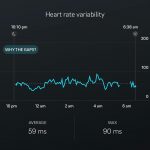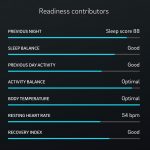This post is a snippet from “Episode 3 – Tracking Your Sleep and Hacks To Get A Better Sleep Tonight” and here I’ll briefly share with you my experience of tracking my sleep with the Oura Ring.
I first heard about this ring on the Ben Greenfield Fitness Podcast[1]https://bengreenfieldfitness.com/podcast/self-quantification-podcasts/what-is-the-oura-ring/. The Oura Ring is a ring, made from scratch resistant titanium, and this device is designed to automatically track your sleep.
You can wear this ring on your finger during sleep, and if you want, you can also wear it during the day. It’s super duper light. It has tracked my sleep most accurately in comparison to tracking my sleep with the Pillow app on an apple watch. When I started to track my sleep a few years ago, I used to track it with an Apple Watch, and it was really good. However, I have noted that with the Oura Ring, the tracking of my sleep is more accurate because it correlates more with the way I feel and also with the times that I wake up.
![]()
The Oura Ring App
The data on the Oura app is detailed, and very insightful. It’s helpful because it actually shows the number of sleep cycles that I’ve had. It’ll show me the hours as well as the percentages of sleep that I’ve had. Because I love all the data… probably because I’m a little bit geeky, but also because it really helps me to optimise my sleep.
The reason for me to optimise my sleep is because I want optimal performance. I want to be able to live a healthy, happy life in which I can feel energised and a life in which I can perform at my very best. So I want to feel focused, I want to feel a good level of concentration, and I want to know that I can pump out a couple of blog posts a week or an episode here or a video there, and I want to know that I’ve got the brain function to do this as well as the physical ability to do so.
This really cool app shows me the hours that I’m awake, it shows me the REM sleep as well as my light sleep and also my deep sleep. And then it also has some really cool sleep contributors.
So each morning when you wake and when you sync the device to your phone, it’ll give you a sleep score, so based on how you’ve slept and based on a couple of parameters such as your total sleep, the efficiency of sleep, your restfulness, your REM sleep, your deep sleep, the sleep latency, as in how long it took for you to get to sleep once you got in bed, and then the timing as well. In the blog post, I’ll share some screenshots with you that you can look at. Because one of the really cool functions as well is the heart rate variability. It’ll show you your high and your low heart rate variability, what it was, and also your respiratory rate, which is really quite cool.
Another reason I’m super happy with the Oura Ring is because it allows me to gain a little bit of statistical insight into how I’m feeling (it takes out the emotion).
Sometimes you’ll wake up and you’ll feel tired even though you’ve had a good number of hours of sleep, but you still don’t feel really motivated or focused. And then what I do, like I’ll actually look at the data, and that’ll confirm for me whether I’m just maybe a little bit lazy or unmotivated or just procrastinating my workout, or whether I actually genuinely should take a rest. So this is how it all came about for me. I wanted to know how and when I could push myself in the gym.
Now, when I was preparing for my bodybuilding competition in 2017, I was tracking my sleep with my Fitbit, and I noted that the more I slept, the better my body would recover. So if I were to get under seven hours of sleep, I would feel really, really tired. Because I was putting the body through a lot of physical stress, I was lifting a lot of weights back then, I learned that I just couldn’t recover as quickly as I needed to. Because obviously, with the competition, there was a deadline. So I learned, at that time, that I needed minimum of eight hours sleep to actually be able to train the next day. So this is where I find it really handy to look at the data, because then that way I can see whether I can push myself or whether I just need to take a rest day.
Many people believe it’s normal to wake up feeling tired, but hey, let me tell you one thing, it is absolutely not normal to wake up tired. I believe it’s your birthright to wake up each day feeling refreshed, energised, and be looking forward to a new day, like it’s a blessing to be alive.
Final Thoughts
I truly believe that tracking your sleep empowers you to take charge of your life and your energy. So with the right data, you can make informed decisions about your bedtime routine and about your training and about living your life to the fullest.
Feel free to pass this post on to a friend who might benefit from it. Stay connected via Facebook and Instagram to stay inspired and live your healthiest life yet! Subscribe to the newsletter below to get the latest posts, videos and recipes delivered as soon as they’re published!

References
| ↑1 | https://bengreenfieldfitness.com/podcast/self-quantification-podcasts/what-is-the-oura-ring/ |
|---|






You must be logged in to post a comment.